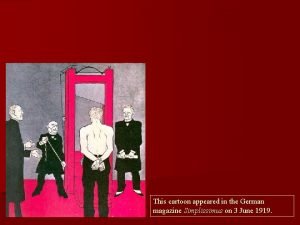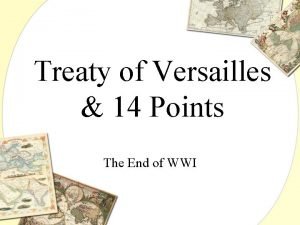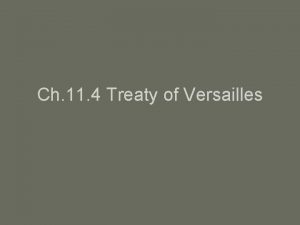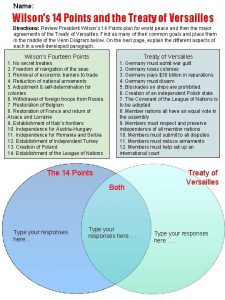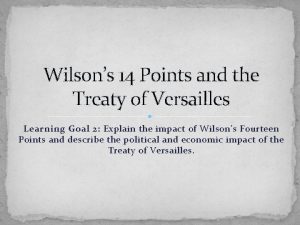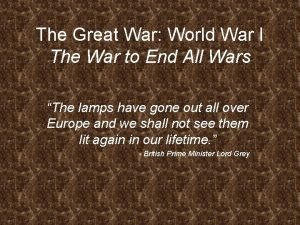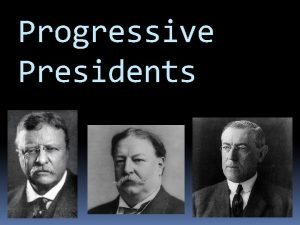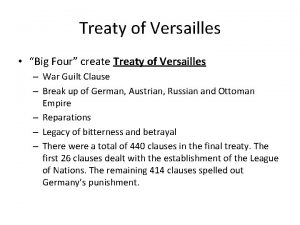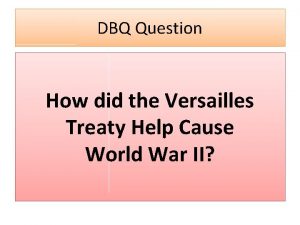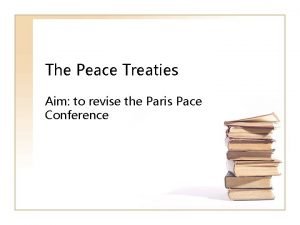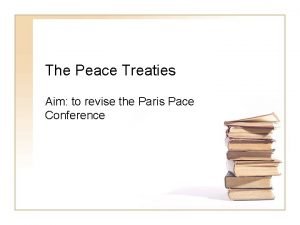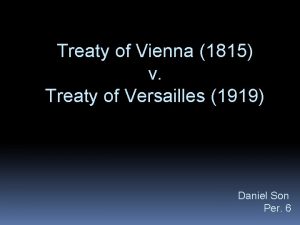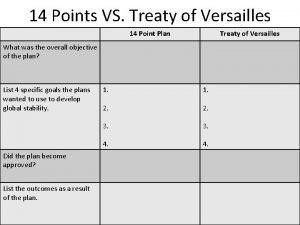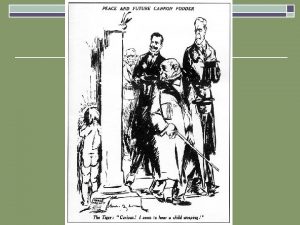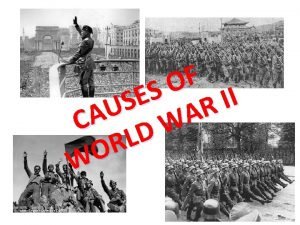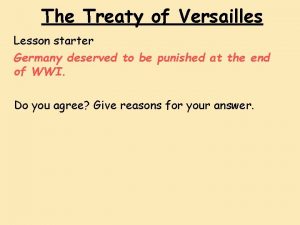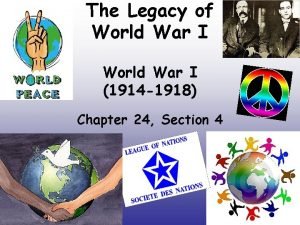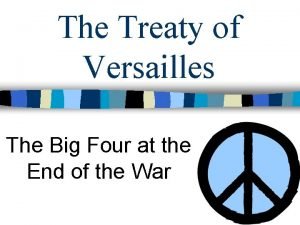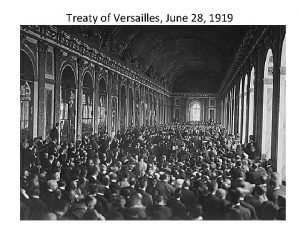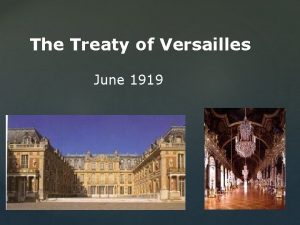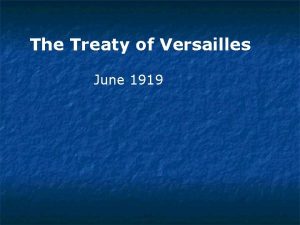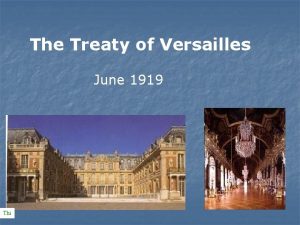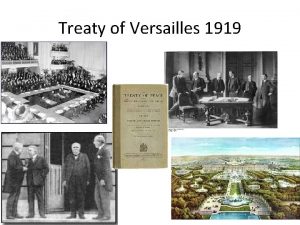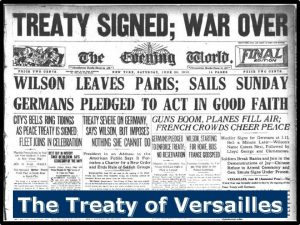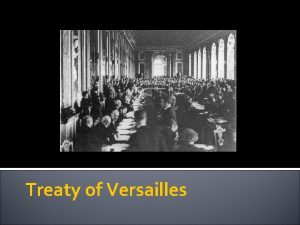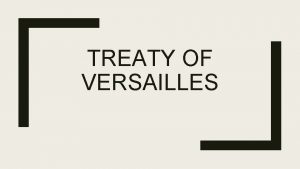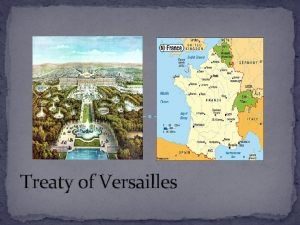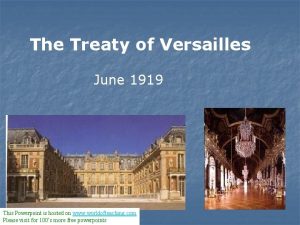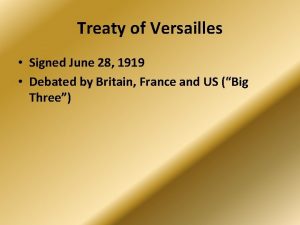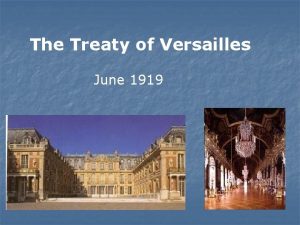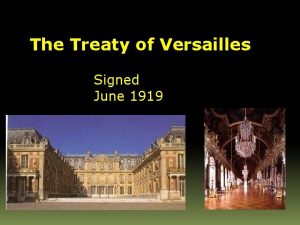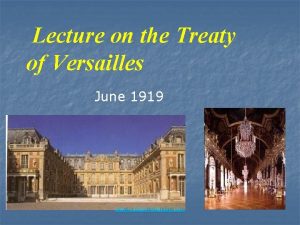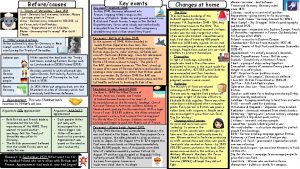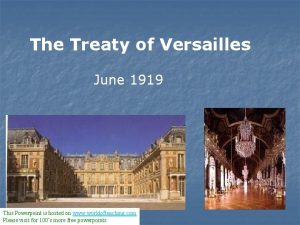The Treaty of Versailles June 1919 Woodrow Wilson

























- Slides: 25

The Treaty of Versailles June 1919

Woodrow Wilson USA David Lloyd-George Great Britain The Big Four Georges Clemenceau France Vittorio Orlando Italy

The Big Four at Versailles in 1919

What did France want from the treaty? Security Revenge Reparations Clemenceau : The Tiger

What did Britain Want? In public Lloyd-George said he wanted to punish the Germans. The British public was very anti-German at the end of the war. In private he realized that Britain needed Germany to recover because she was an important trading partner. David Lloyd-George

What did America Want? Woodrow Wilson wanted the treaty to be based on his Fourteen Points He believed Germany should be punished but not severely. He wanted a just settlement that would not leave Germany feeling resentful Woodrow Wilson

Wilson Presents His Plan n Fourteen Points-Plan for World Peace n Fourteen Points speech given before Congress, points divided into three groups n First 5 points Wilson believed had to be addressed to prevent another war

1. 2. 3. 4. 5. 14 POINTS There should be no secret treaties among nations. Freedom of the seas should be maintained for all. Tariffs and other economic barriers among nations should be lowered or abolished in order to foster free trade. Arms should be reduced “to the lowest point consistent with domestic safety, thus lessening the possibility of military responses during diplomatic crises Colonial policies should consider the interests of the colonial peoples as well as the interests of the imperialistic powers

14 -points continued 6 -13 dealt with boundary changes n 14 th point called for a creation of and international organization to address the diplomatic crises like those that had sparked the war n League of Nations- provide a forum for nations to discuss and settle their grievances without war n

The Allies Reject Wilson’s Plan n Peace Conference did not include Central Powers or Russia Treaty of Versailles-created new nations, shifted boundaries, and barred Germany from maintaining an Army Germany made to pay reparations-pay war damages amounting to 33 billion

Treaty’s Weaknesses n n n Flaws in the treaty sowed the seeds of postwar international problems that eventually lead to WWII Treaty humiliated Germany War-Guilt Clause-forced Germany to admit sole responsibility for starting WWI No way Germany could pay the bill Russia was excluded from the peace conference and lost more territory than Germany (Russia had the most causalities in war and fought for 3 years)

Debate of the Treaty n n n Some believed treaty was too harsh A few felt that the League of Nations threatened US isolationism and the constitutional right of Congress to declare war Wilson set out in the US and spoke about the League of Nations Became ill on October 2, 1919 and suffered a stroke US Senate rejected the League of Nations and signed a separate treaty w/ Germany in 1921

THE LEGACY OF THE WAR n n Many Americans looked forward to return to “normalcy” World War I had many changes in the U. S. n Strengthened military n Social change for African Americans and Women n Called WWI “the war to end all wars” n Treaty of Versailles settled nothing n Adolf Hitler emerged as an angry WWI vet and rose to power in Germany


100, 000 De-militarised The Military Clauses


Territorial Losses Germany lost ALL of her overseas colonies Alsace-Lorraine was given to France

Posen was given to Poland so that she would have access to the Baltic Sea. This area became known as the Polish Corridor. It meant that East Prussia was cut off from the rest of Germany.

The Rhineland was to be demilitarized

The Saar coalfields were given to France for fifteen years The port of Danzig was made a Free City under the control of the League of Nations

The War Guilt Clause "The Allied and Associated Governments affirm, and Germany accepts, the responsibility of Germany and her Allies for causing all the loss and damage to which the Allied and Associate Governments and their nationals have been subjected as a consequence of a war imposed upon them by the aggression of Germany and her Allies. " Article 231 GERMANY ACCEPTED RESPONSIBILITY FOR STARTING THE WAR

REPARATIONS Germany agreed to pay for the damage caused by her armies during the war. The sum she had to pay was later fixed at £ 6, 600 million

Germany was forbidden to unite with Austria

How did Germans React to the Treaty? Germans thought the Treaty was a “diktat” : a dictated peace. They had not been invited to the peace conference at Versailles and when the Treaty was presented to them they were threatened with war if they did not sign it. The Treaty was NOT based on Wilson’s Fourteen Points as the Germans had been promised it would. Most Germans believed that the War Guilt Clause was unjustified. The French and British had done just as much to start the war The loss of territory and population angered most Germans who believed that the losses were too severe. Many Germans believed the German economy would be crippled by having to pay reparations.

The Treaty of Versailles was signed on 28 th June 1919. It officially ended the 1 st World War. Many historians believe that it was a major cause of the 2 nd World War. Most Germans were horrified by the harshness of the Treaty. There was anger amongst all groups in Germany, no matter what their political beliefs. Some German newspapers called for revenge for the humiliation of Versailles. However anger was also directed against the government in Germany. Already there was a myth growing in the country that the German army had been “stabbed in the back” by politicians…the so called “November Criminals”. Now these same politicians had signed the “Diktat”, the dictated peace. The new democracy in Germany was now closely linked with the humiliation of Versailles.
 German cartoon shows
German cartoon shows Treaty of versailles vs 14 points
Treaty of versailles vs 14 points Wilsons fourteen points and the treaty of versailles
Wilsons fourteen points and the treaty of versailles Comparing the 14 points & treaty of versailles paragraph
Comparing the 14 points & treaty of versailles paragraph 14 points compared to the treaty of versailles
14 points compared to the treaty of versailles Nationalism
Nationalism Woodrow wilson
Woodrow wilson Good morning please
Good morning please Whats the treaty of versailles
Whats the treaty of versailles The treaty of versailles
The treaty of versailles Treaty of versailles terms
Treaty of versailles terms How did the versailles treaty help cause ww2
How did the versailles treaty help cause ww2 Treaty of versailles gargle
Treaty of versailles gargle Treaty of versailles gargle
Treaty of versailles gargle Treaty of vienna 1815
Treaty of vienna 1815 What year was the treaty of versailles signed
What year was the treaty of versailles signed 14 points vs treaty of versailles
14 points vs treaty of versailles 0
0 Treaty of versailles terms
Treaty of versailles terms Conditions of the treaty of versailles
Conditions of the treaty of versailles Whats treaty of versailles
Whats treaty of versailles The big 4 and the treaty of versailles interactive notebook
The big 4 and the treaty of versailles interactive notebook Clemenceau the vampire
Clemenceau the vampire Did wilson want to join the league of nations
Did wilson want to join the league of nations The big 4 treaty of versailles
The big 4 treaty of versailles Article 231 of the treaty of versailles
Article 231 of the treaty of versailles
